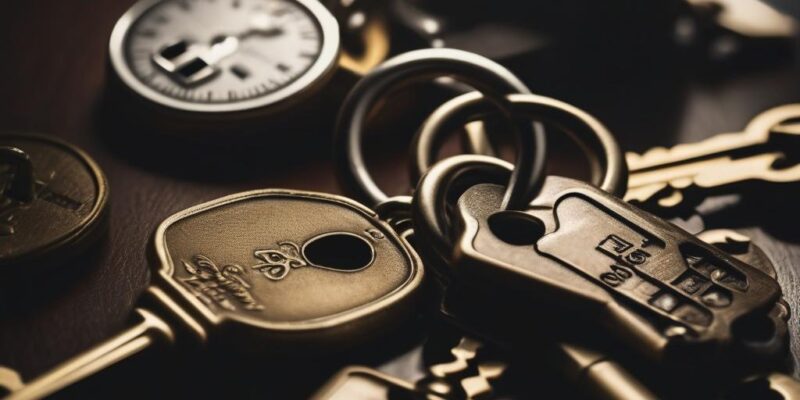-
Table of Contents
- What Has Many Keys But Can’t Open a Single Lock?
- The Literal Interpretation
- The Metaphorical Interpretation
- 1. Knowledge
- 2. Opportunities
- 3. Relationships
- Real-Life Examples
- 1. Steve Jobs and Apple
- 2. Oprah Winfrey and Success
- 3. Finding True Love
- Conclusion
- Q&A
- 1. What are some other possible interpretations of the riddle?
- 2. Can you provide more examples of individuals who had many keys but couldn’t open a single lock?
- 3. How can we apply the lessons from this riddle in our daily lives?
- 4. Is there a definitive answer to the riddle?
- 5. What is the significance of riddles in general?
Have you ever come across a riddle that goes, “What has many keys but can’t open a single lock?” This intriguing question has puzzled many people over the years, leading to various interpretations and answers. In this article, we will explore the different perspectives and delve into the fascinating world of keys and locks.
The Literal Interpretation
At first glance, the riddle seems to be referring to an object that possesses numerous keys but cannot unlock anything. One possible answer that comes to mind is a piano. A piano has many keys, each producing a different musical note, but none of these keys can open a lock.
However, this interpretation is just the tip of the iceberg. The riddle can be seen as a metaphor for something deeper and more profound. Let’s explore some alternative explanations.
The Metaphorical Interpretation
When we look beyond the literal meaning of the riddle, we can find a metaphorical interpretation that relates to various aspects of life. Here are a few possible explanations:
1. Knowledge
One interpretation of the riddle is that the “keys” represent knowledge or information. In this context, the riddle suggests that having access to a vast amount of knowledge does not guarantee the ability to solve a specific problem or open a particular “lock.” It emphasizes the importance of practical application and critical thinking rather than simply accumulating knowledge.
2. Opportunities
Another interpretation is that the “keys” symbolize opportunities. Just like a key can open a door to new possibilities, opportunities can unlock doors to success and personal growth. However, having many opportunities does not guarantee success if one fails to seize them or use them effectively. This interpretation highlights the importance of recognizing and making the most of the opportunities that come our way.
3. Relationships
A third interpretation of the riddle relates to relationships. In this context, the “keys” represent the people we encounter in our lives. Each person has their own unique qualities and potential, but not every relationship can unlock the door to a deep and meaningful connection. This interpretation emphasizes the importance of finding the right “key” or person who can truly open up our hearts and minds.
Real-Life Examples
To further illustrate the riddle’s metaphorical interpretations, let’s explore some real-life examples:
1. Steve Jobs and Apple
Steve Jobs, the co-founder of Apple Inc., had access to a vast amount of knowledge and information about technology. However, it was his ability to apply that knowledge creatively and think differently that allowed him to revolutionize the tech industry. Jobs had the “key” to unlock the potential of technology and create products that changed the world.
2. Oprah Winfrey and Success
Oprah Winfrey, a media mogul and philanthropist, encountered numerous opportunities throughout her career. However, it was her determination, hard work, and ability to seize those opportunities that allowed her to become one of the most influential figures in the entertainment industry. Winfrey had the “key” to unlock her own success.
3. Finding True Love
In the realm of relationships, finding true love can be compared to finding the right “key” that opens the door to a fulfilling and lasting partnership. It may take time and effort to find the right person who truly understands and complements us, but when we do, it can lead to a lifetime of happiness and fulfillment.
Conclusion
The riddle, “What has many keys but can’t open a single lock?” invites us to think beyond the literal meaning and explore the metaphorical interpretations. Whether it’s about knowledge, opportunities, or relationships, the riddle reminds us that having access to many “keys” does not guarantee success or fulfillment. It is the ability to apply knowledge, seize opportunities, and find the right connections that truly unlocks the doors to a meaningful life.
Q&A
1. What are some other possible interpretations of the riddle?
Some other possible interpretations include creativity, problem-solving skills, and personal growth.
2. Can you provide more examples of individuals who had many keys but couldn’t open a single lock?
Another example is Thomas Edison, who had thousands of failed attempts before successfully inventing the light bulb. Each failed attempt provided him with valuable knowledge and experience, but it was the combination of those attempts that eventually led to success.
3. How can we apply the lessons from this riddle in our daily lives?
We can apply the lessons by focusing on the quality rather than the quantity of our knowledge, being proactive in seizing opportunities, and investing time and effort in building meaningful relationships.
4. Is there a definitive answer to the riddle?
No, the riddle is open to interpretation, and the answer may vary depending on the perspective of the person solving it.
5. What is the significance of riddles in general?
Riddles serve as mental exercises that challenge our thinking and problem-solving abilities. They encourage creativity, critical thinking, and the exploration of different perspectives.


